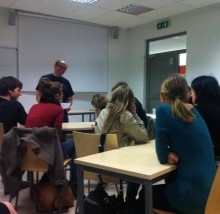IATEFL Poland: Mark Andrews' "Live Lesson"

Mark Andrews presented the first of the innovative ‘Live Lesson’ sessions, in which a teacher (himself, in this case) taught a group of students (7) who had never met each other before. Generally, the session leaders were free to organise their sessions as they wished, and Mark framed the event as a teacher observation session. Once the lesson was finished, the participants (more than 40) exchanged impressions in small groups and then shared their reflections on any aspect of the lesson in an open discussion.
Mark’s teaching approach was clearly driven by dogme, with minimal resources and much of the input driven by the interests, knowledge and needs of the students as and when they emerged. The tools at his disposal, a white board and pen, 2 bottles of beer and an advertising leaflet for the LIDL supermarket chain which was promoting a ‘taste of Poland’ in England. The lesson began by Mark being somewhat deliberately vague, inviting students to respond to ‘So, you won two gold medals, then?’ It soon emerged that he was talking about Poland’s performance in the Olympic Games.
During the lesson, the students had ample opportunities to communicate in a teacher-led discussion or when working in small groups. When factual information was sparse, the students were encouraged to use their smart phones to find or check out anything they needed to know so they had content to actively contribute. This was especially effective when the focus was on looking for similarities and differences related to food and drink in Poland and Britain.
Useful language – vocabulary, structures, and phrases for communication (for example, Sorry, I don’t understand), were elicited, mimed or presented as necessary, and were written on the board, contextualised and modelled along the way. By the time the lesson came to a close, the board was full and reflected the richness of language that had emerged naturally in a 30 minute lesson.
Finally, the students were asked to write comments on the lesson and what they had learnt on a piece of paper. These were read out to all. It was quite clear that the students had thoroughly enjoyed the approach, indeed, all wanted more of it. Here’s a quote from one :
‘I think that this lesson was very, very interesting and I liked it very much! The subjects were funny and the atmosphere was superb! J’
The final stage of the session was given over to the participants. Group and open discussion pretty much reflected the comments from the students: the lesson was interesting and it generated lots of opportunities for speaking with much of the content coming from the students themselves. Concerns were that continual use of the approach might make it difficult for teachers to cover mandatory syllabus content, and the cost-effectiveness of frequent use of elicitation in terms of time and attention to an individual rather than the needs of the group as a whole. Having said that, the approach itself was well-received, and teachers in attendance had the opportunity to watch it in action – a rich experience and something we don’t often get the opportunity to do. Furthermore, it lifted the teaching approach off the ELT literature page, giving teachers deeper and more meaningful hands-on contact with a concept often heard or read about but rarely experienced. Clearly, teachers’ teaching repertoires had been expanded by virtue of this session.
Mark concluded by encouraging us to do more lesson observation, perhaps through mutual observations or watching video recordings of ourselves in action. All present agreed that there was much to be gained by this – a testament to the relevance of the ‘live lesson’ experience.




Add new comment